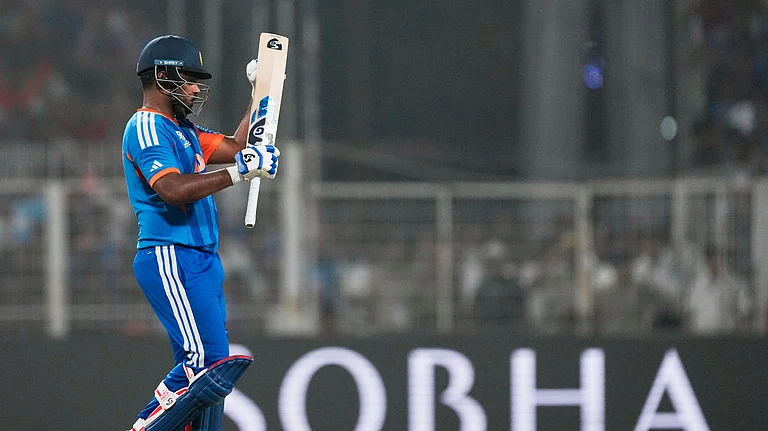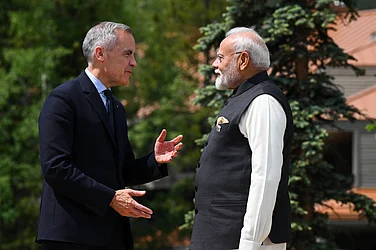Abdul Rahim Shoda doesn’t want to talk about Sarah Groves, the 24-year-old British tourist who was stabbed to death four years ago on New Beauty, his houseboat on Srinagar’s Dal lake. Sitting in a shikara, Abdul says he has said all he had to say, several times, about what happened that fateful April morning in 2013. “My statement has been recorded in court. I have been cross-examined. My sons have recorded their statements, they too were cross-questioned. My wife too has given a statement. Now we don’t go to the court anymore,” he says, clearing wanting to end the conversation. On the well-decorated shikaras lined up beside Abdul’s, the boatmen sit idle as there are few tourists around. An elderly boatman, who overheard Abdul, quipped, “The justice system is rotten everywhere, especially in India. This case will take years.”
On April 6, 2013, Sarah was found dead inside her rented cabin in the New Beauty houseboat. Abdul says Sarah was like his daughter. “She was engaged to my son and the wedding was about to happen. We no longer discuss the case in the family as it brings back all those memories,” he says. “As long as our family was needed in court, we didn’t miss a single hearing date. You can check it from the court records.”
Describing Richard de Wit, the Dutch national accused of killing Sarah, as a psychopath who would do anything to save himself, Abdul says, “We hear he converted to Islam in prison. It’s just theatrics to distract attention from the case.” The police had arrested 43-year-old Richard a few hours after the murder, from Qazigund town, around 77 km south from the crime scene, towards Banihal tunnel. Son of Hendrik Pieter de Wit of Ridder Kerk in the Netherlands, Richard was trying to leave the Valley, according to the chargesheet, after stabbing Sarah to death. The body had 43 wounds on it. At the time of arrest, Richard was in wet clothes and barefooted, but was carrying his passport.

New Beauty houseboat
Sarah had travelled to Srinagar in February 2013. Apparently, she intended to stay in the Valley for just four days, but stayed longer, according to Abdul, after deciding to marry his son Samir. Richard arrived at New Beauty on April 3 and stayed in the cabin next to Sarah’s. They were the only two tourists on the boat.
Afadul Mujtaba, then DIG (Central Kashmir), was the first to question the accused. “He seemed to be paranoid and thought the Dutch intelligence agencies were after him for his anti-government political beliefs. He murdered Sarah presuming her to be a Dutch agent,” says the officer, adding that all the circumstantial evidence suggested that Richard was involved in the murder. During the investigation, Mujtaba had said Samir owed Sarah some money.
The then investigating officer, Nazir Ahmad Teli, tells Outlook the FIR was lodged on Abdul’s complaint and that Richard confessed to the crime in custody. Complaining that the trial is moving at a snail’s pace due to the political unrest, Nazir says, “Sometimes the witnesses are not present, sometimes the accused doesn’t want the lawyer…the case drags on.”
This is just one of the 10 murder cases being heard at the court of principal district and sessions judge in Srinagar. Court clerk Mushtaq Ahmad says Sarah’s case will take another eight to nine years. “There is the case of a young boy, Wamiq Farooq, who was allegedly killed by the police. There are other cases of extrajudicial killings in which senior police officers are accused of killing young boys and branding them as militants. These cases are being heard for years now.”
Showing the file of the Sarah murder case, which was damaged during the 2014 floods, Mushtaq points out that it is one case where hearings have, in fact, been held quite regularly. “But the accused rejects every lawyer the court provides him,” he says.
According to the case file, Richard had told a panel of psychiatrists at Srinagar’s Government Medical College that he used cannabis and heroin, allegedly provided by the houseboat owner, during his last three days on the houseboat. The psychiatric opinion report states Richard claimed to have resigned as a councillor in the Netherlands and believed that his country’s government was monitoring his activities as he belonged to the opposition party. Richard believed the government was using his friends, relatives and others to keep tabs on him—and those who didn’t want to spy for the government broke all ties with him.

Richard de Wit, from the Netherlands
Before hiring a cabin in New Beauty, Richard had stayed in another houseboat for three days. He told the psychiatrists that he shifted to New Beauty as he suspected the owner of the first houseboat had been paid by the Dutch government to keep a watch on him. According to the report, “during his stay in the houseboat (New Beauty), he met this lady (Sarah) several times…. He also reported that she might have been part of a plot and the Dutch government might have hired her as well to keep an eye on him. Richard reported that she spent a lot of time in the kitchen and was thus able to keep an eye on him.”
The report, however, has no details of the murder he allegedly committed as Richard did not talk about it with the psychiatrists. Neither did he show any sign of remorse or regret. The doctors concluded that Richard had a “well-systematised delusional belief” about the Dutch government following him.
Sarah’s parents, who have visited Srinagar many times to attend court proceedings, naturally find the long-drawn trial, considered normal in India, unacceptable and frustrating. They are also disappointed with the quality of cross-examination and the behaviour of public prosecutors. “Out of 98 hearings,” they say, “nothing happened in 66.” In an e-mail response to Outlook’s queries, they cited several reasons why little progress had been made in the case: “lack of translator, loss of key exhibits, the accused refusing to attend court, judge on holiday, judge ill or not properly prepared or otherwise occupied, non-appearance of witnesses or medical experts, accused not brought to court due to lack of security guards, civil unrest” and so on. In fact, there was also an occasion when the case was not heard due to bad weather and the next hearing scheduled for two-and-a-half months later. That the accused had no legal representation also became a reason for unfruitful hearings.
“On the day this case is scheduled, it is heard after many other petty cases,” says Sarah’s father Victor Groves. “If the court opens at 10 am, this case is rarely heard until after mid-day. This case should be top priority on any day that it is listed and should be heard first, not last.”

Victor Groves, Sarah’s father, is fed up with the slow trial
According to the parents, the prosecution has failed to bring witnesses to court as planned. “Few, if any, sanctions or penalties have been imposed on witnesses who simply do not show up,” says Victor. “For example, PW07, a key witness, was first summoned to appear on March 28, 2014, but he is yet to appear in court. Despite the declared aim by all parties in September 2015 to hear all prosecution witnesses by the end of 2015, of the 25 who remained to be heard at that time, only one has been heard so far.” There are 46 listed witnesses in the case.
He says key exhibits have been mislaid, including the weapon of defence, and when produced in court, they have been handled without gloves. “Most, if not all, forensic evidence has been destroyed. Exhibits and forensic evidence were not stored properly, which resulted in much of it being lost in the floods,” says Victor.
Victor claims it was impossible to talk with the first public prosecutor, Abdul Teli, “who just wouldn’t listen…. Eventually, the only way we could liaise with him was via the British High Commission in New Delhi.” Teli was replaced in the summer of 2015, but Victor is disappointed with the second public prosecutor too. “He turned up at the last session in denim jeans and an open-neck shirt. This is unacceptable in any court of law, let alone at a murder trial,” he says. The public prosecutor had no e-mail address and rarely picked up the phone, while SMS texting was banned due to the unrest.
Some of the reasons given for court adjournments without any progress being made are unacceptable to Sarah’s parents. “In a case of such importance, warnings could have been given in most instances, e.g. non-attendance of witnesses, judge on holiday or receiving training, nobody available to accompany the accused from jail to court, or defence counsel with ‘more important matters to attend to’ in Delhi,” he says. “Due to the protracted timescales, this case is on its second judge, its third public prosecutor and, soon, quite possibly its fourth or even fifth defence counsel. This lack of continuity, combined with poor paperwork and makes it very difficult to reach a safe conclusion.”
The official court papers, of all types, are sub-standard and frequently not produced in English. “We believe we should receive, as a matter of course, official court transcripts in English after every session whether witnesses are heard or not,” says Victor.
The current public prosecutor, Sayeed Maqbool, says uncertain conditions in Kashmir, especially last year, led to delays and cancellation of hearings as the police failed to bring the accused to the court. Asked why the case didn’t come up for hearing on the previous date, he said the court was to be shifted.
Teli claims that had he remained the public prosecutor in the Sarah murder case, the court would have convicted the accused by now. “Unless a private lawyer is hired, the case will not move forward,” he says.
Away from the courts, the killing has changed a lot in the Shoda family. According to Abdul, this was the first murder of any foreigner on the lake. “We have risked our lives to save foreigners. There is no case of any other foreigner being harmed in any houseboat,” says Azim Tuman, former head of the Houseboat Owners’ Association and a well-known name in the Valley’s tourism sector. Abdul points out that Sarah’s murder has changed something intangible, and for the worse. “Now, I would panic if I had two foreigners as guests,” he says.
***
The Case So Far
- There have been 98 hearings, but no progress during 66 of those
- It is on its second judge, third public prosecutor and fourth defence counsel
- Of 46 witnesses, only 23 have been fully examined and cross-examined
- No witness processed since September 29, 2015
Appeal Of Parents
- Take this case first on all hearing dates, before other cases
- Impose a lawyer on the accused (the judge has the power to do this); his prevarications have resulted in months of delays and threaten to do so again
- Speed it up by planning for hearings with maximum two weeks in between
- Tighten up on summons to witnesses, to ensure they attend, and make phone contact a day or two earlier to confirm attendance
- Fine witnesses who do not attend when scheduled
- Ensure that the accused is always brought to court
By Naseer Ganai in Srinagar


























